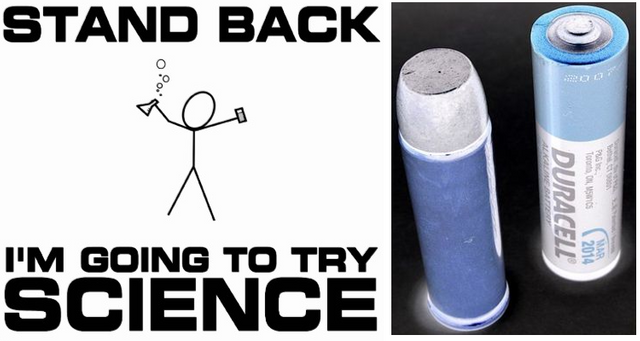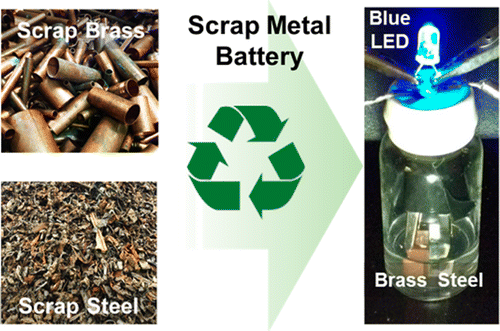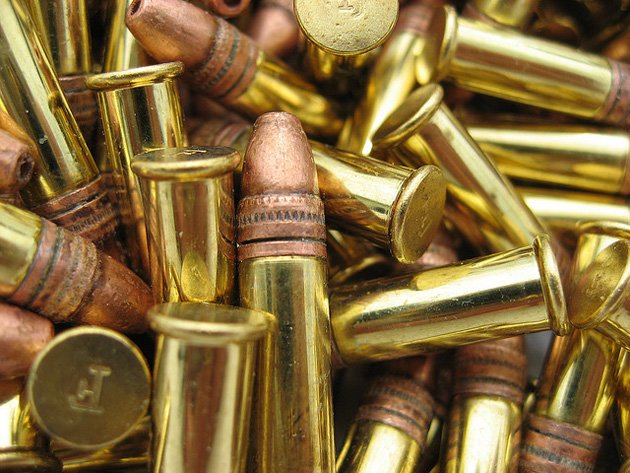Weird Science! : From Bullets to Batteries?

Researchers have found a safe and effective way to turn junkyard scrap you have laying around into powerful rechargeable batteries.
We take batteries for granted now days. We tend to think of them as a recent invention but they're hardly recent.
In the first century BC a scientist and experimenter who's name has been lost to history combined a strong acid, some metal plates and a terracotta pot, producing the world's first battery. Of course like most discoveries throughout history it would have to lay in wait for thousands of years before we figured out what to do with it.
It wasn't until 1800 when Alessandro Volta while attempting to disprove Luigi Galvani's theory of animal electricity, managed to construct the first known battery used as an experimental apparatus.
Since that time battery technology has improved to the point where each of us carries around enough chemical energy to blow a crater in the ground if we drop our phones too hard. However we have a serious problem.
The technology used to create these batteries is leaving a huge trail of hazardous waste in it's wake. Furthermore, outside of the infamous "Lemon Battery", almost none of us has ever actually put a battery together. We're using something in our daily lives and we have no idea how it works.
In my next article on this subject we'll go into the nuts and bolts of how batteries are built and build one from the ground up. But Weird Science! has always been about the strange things that science is telling us and I like to stay on the cutting edge.
I've had a bit of MacGyver in me since I was a kid.
I literally grew up on the show and, I mean who wouldn't want that marvelous mullet...

Ladies, this hair style is coming back soon, so watch out!
I've been hoping for an article to cross my desk that shows something unique and innovative in battery science, every since a friend and I jumpstarted my dead truck battery while out hunting, with a 12 pack of beer and some tent pegs (story for another day).
Science decided not to disappoint me this week! According to The Journal of the American Chemical Society a group of scientists have discovered a new method for constructing a battery.
The thing is they really underplay the potential in this.
The reality is they have actually built a super capacitor!
From household scrap!
A super capacitor is a device that has the best characteristics of capacitors and batteries.
*Including... *
An ultra rapid charge time.
High energy conversion efficiency and low thermal losses.
Yet it also has the energy density and smooth discharge curves of a battery.
This is groundbreaking and revolutionary on it's own.
But the best part is , you can make this out of scrap you have laying around the house!
Here's what you need...
- Brass, any kind, even scrap brass shavings
- Steel recycled steel cuttings from construction sites would seem to be best, even screws.
- Muratic Acid, specifically commercial grade pool cleaner
- Potassium Hydroxide, also known as Lye aka drain cleaner (this may be the hardest to find)
- Glass Jar to hold it
- A regulated voltage source for the anodizing process
- A multi-meter to check voltages.
What do you get for that?
Evidently, 1.6v of awesomeness with an energy density on par with a lead acid battery of the same weight.

This paper is currently paywalled, but here is a link to the paper on sci-hub.cc that isn't paywalled because honestly, stuff like this has no business being paywalled.
Reading the paper, the secret sauce here, is in the process they use to anodize the steel the and the brass.
Anodization is a fancy word that means to put a thick layer of oxide, aka rust on it. They use the term "nanopore anondization", but as fancy as that sounds, there is nothing here you couldn't do at home with a soldering iron, rubber gloves and some safety googles.
The claims made in the paper are interesting and honestly I want to repeat this, but at the same time...
I think I can improve on this process.
They are asserting that the oxide layer increases surface area and this increased surface area is responsible for the enhanced energy density and electron mobility.
Steel is an interesting component choice, but I believe lead has better characteristics for this.
Every substance has a potential energy relative to a baseline (hydrogen), and the further apart 2 substances are in potential, the greater the voltage produced.
In other words, batteries work because of the energy potential between the two metals involved.
For example, the most powerful battery known is comprised of Strontium Fluoride and if you look at this chart you will see that they sit on opposite ends of the spectrum. I've made a battery from aluminum and zinc using that chart and found it to be highly accurate.
In fact, you can use that chart to calculate the voltage potential of just about any substance you can imagine, it's handy and you can book mark it.
Anyways, lead sits further away from from copper than iron does. Steel is just iron with some carbon added, brass is just an alloy of copper and zinc. So taking at face value that they are getting 1.6v per cell from the current mixture I hypothesize we can double that to 3v which would reduce the number of cells needed and thus reduce the weight of the battery by 50%, simply by swapping steel for lead.
The trick will be getting lead to anodize properly. Lead isn't particularly friendly to being anodized. But I've made lead oxide anodes before and it's more a matter of pretreating the surface and clearing your solvent off completely and then controlling your voltage properly. It's not magic, but it does take patience.
So what is made from lead and brass and is easy to get your hands on?

I dunno, but I'll probably think of something...
Stay tuned next week when I document myself attempting to verify their results and also checking my own hypothesis.
images courtesy, pixabay, pinterest, acs.org and ammoland.com
further reading
http://pubs.acs.org/doi/full/10.1021/acsenergylett.6b00295
https://en.wikipedia.org/wiki/Standard_electrode_potential_(data_page)
If this turns out to be true, I may not need to run to the store in the middle of the night for batteries anymore. What are your thoughts? Are you going to try this at home too?
You are just so badass, can't wait to see how this turns out. I would like to try this with the boyz if you can help me with materials.
@williambanks love the article. Would love to see you do a video. I would but don't have everything I need right now since I moved. Keep up the good work you have my follow.
This was a fun post. It would be fun if you made a video of your battery or something!
Oh thanks! I'm planning on it. Right now I'm trying to find lye at walmart. Looks like all the drain cleaners have moved to something else.
Try a hardware store. Lowes carries NaOH, so if you've a lowes near you.
I'm in Mexico and have yet to find a lowes. But they do have home depot. Going there now.
I live in mexico too. Homedepot had it last time we needed it for cleaning.
Lol.... This is just outrageously funny! Love how you put I tge twist of bullets and mullets. I loved MacGuyver but hated that they would keep out one component so you couldn't recreate the real thing. The German word is Bevormundschaften. Make a mouth Infront of your own in a way. Bad habbit to teach kids. Responsibility is a much harder thing to teach. :)
Thanks! Glad you caught that and I had no idea about the german thing!
At a first glance (I only read the abstract) 20wh/kg seem a bit low, but I'm definitely waiting for your results and to read more about this.
@chryspano There's also the little matter of using KOH. I looked over their materials source list and I think they may have been using Sodium Hydroxide. The manufacturer lists the ingredient as Sodium not Potassium These things are very similar, but not the same and it could have effected results.
Fortunately I have access to a lab that uses reagent grade KOH for cleaning the lab glass.
Thinking I'll try the experiment with reagent grade KOH from the lab and also some drain cleaner from Walmart and see if there is a difference. I suspect there will be.
Looking forward to the next piece, and growing back my mullet in the meantime... until wifey figures it out. :)
I keep telling @ghostwriter I plan to grow a mullet again. She's mulling it over ;)
Haha, I'd have some cold nights if I tried that. :)
Your wife would be horrified! You know how much she hates those things. She'd never be able to take you seriously.
Please let us know about your findings! Looking forward to read them. By the way, I do not know whether you read this interesting post about batteries.
Join us on #steemSTEM
The scientific article you discuss is weird, but promising as well! We hope you will write some follow-up posts showing how you will manage (or not) to reproduce the results at home!